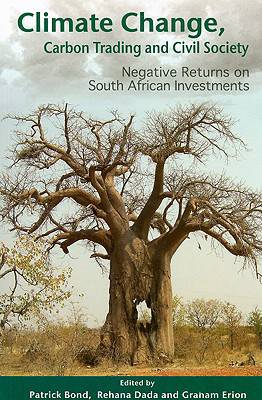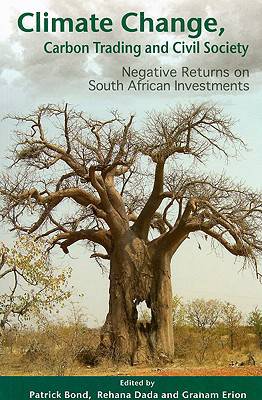
- Afhalen na 1 uur in een winkel met voorraad
- Gratis thuislevering in België vanaf € 30
- Ruim aanbod met 7 miljoen producten
- Afhalen na 1 uur in een winkel met voorraad
- Gratis thuislevering in België vanaf € 30
- Ruim aanbod met 7 miljoen producten
Zoeken
Climate Change, Carbon Trading and Civil Society
Negative Returns on South African Investments
Paperback | Engels
€ 50,45
+ 100 punten
Omschrijving
Can global warming be mitigated by carbon trading? With climate change posing perhaps the gravest threat to humanity in coming decades, and with free market economics still dominated by a few wealthy nations, it is little wonder so much effort has gone into creating a carbon market, no matter how much evidence has recently emerged about its flaws. South Africa, a revealing pilot site, has initiated carbon trading projects with adverse economic, environmental, and social impacts. This country pollutes at a rate 20 times higher than even the US, measured by CO2 emissions generated by each GDP dollar per person, so the idea of trading for carbon reductions is seductive - and potentially lucrative. Current state policy is supportive and a former environment minister is a market promoter, alongside the World Bank, the Dutch government, and big oil companies.
Specificaties
Betrokkenen
- Uitgeverij:
Inhoud
- Aantal bladzijden:
- 231
- Taal:
- Engels
Eigenschappen
- Productcode (EAN):
- 9781869141417
- Verschijningsdatum:
- 19/03/2009
- Uitvoering:
- Paperback
- Formaat:
- Trade paperback (VS)
- Afmetingen:
- 155 mm x 239 mm
- Gewicht:
- 385 g

Alleen bij Standaard Boekhandel
+ 100 punten op je klantenkaart van Standaard Boekhandel
Beoordelingen
We publiceren alleen reviews die voldoen aan de voorwaarden voor reviews. Bekijk onze voorwaarden voor reviews.










